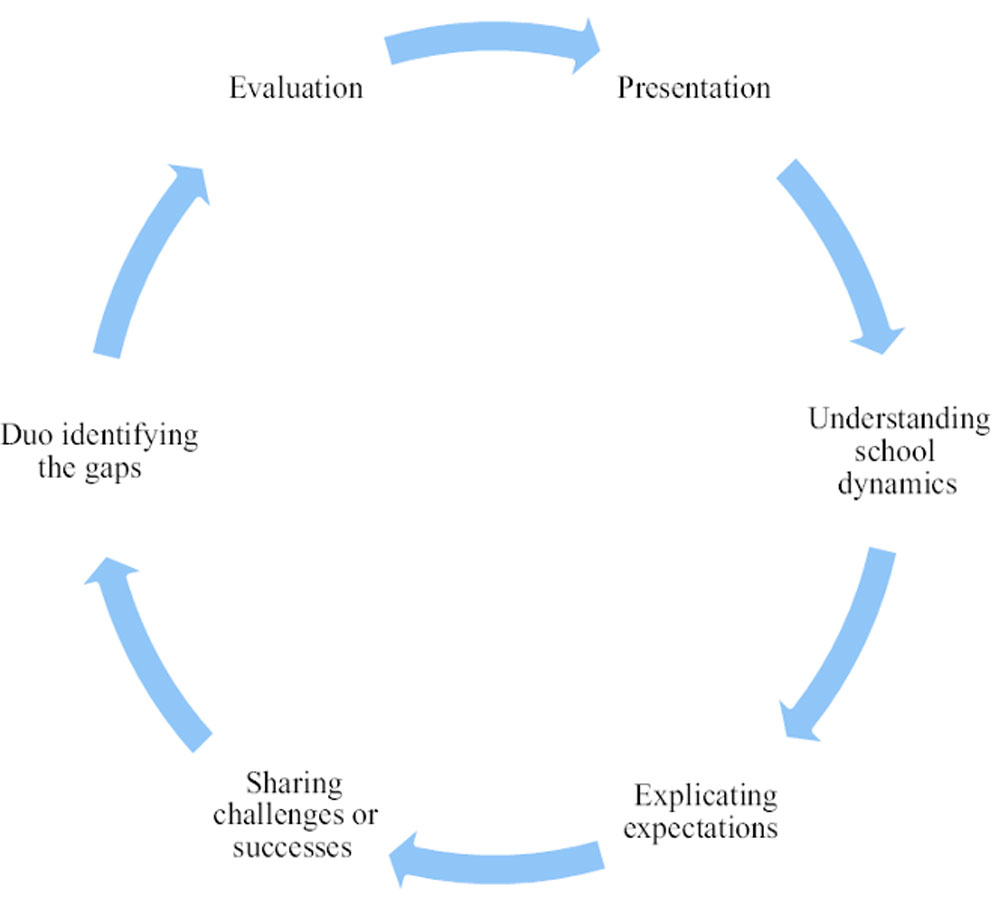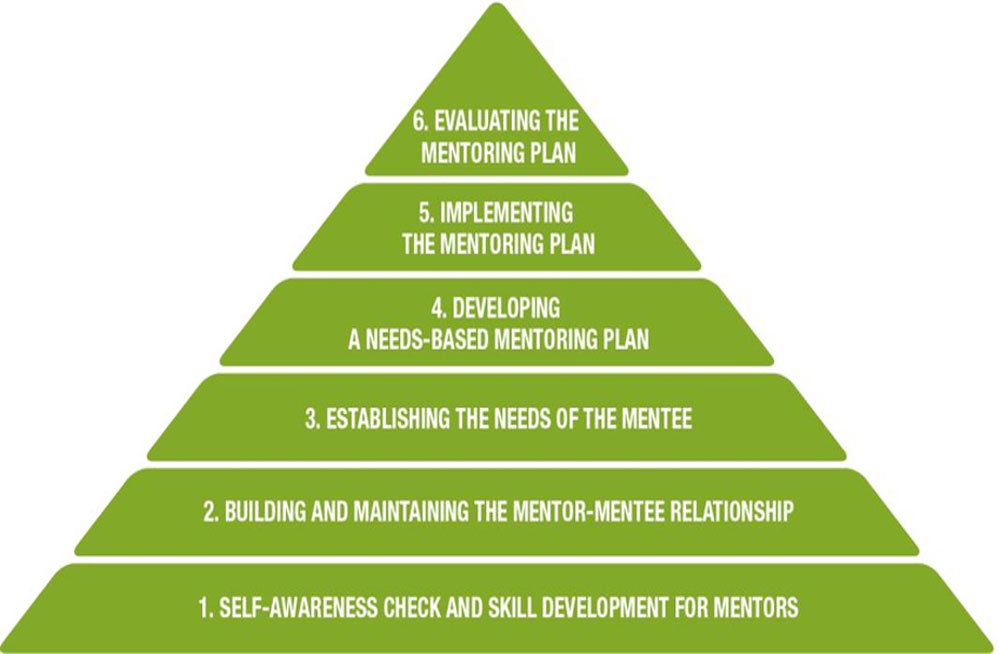
Introduction:
What is mentoring and why is it important for educators?
Mentoring is a professional relationship and interaction between a mentor and a mentee. Mentoring provides a teaching and learning opportunity that enhances the professional development of both mentors and mentees. Mentors benefit from faculty growth and mentees benefit from many aspects of mentorship such as career planning, advancement, promotion, and improvement. This collaboration is mutually beneficial to both the leader and the learner.
Why is mentoring with diversity, equity, inclusion, and justice (DEIJ) in mind important?
Mentoring with DEIJ in mind is of the utmost importance if we want to retain new teachers - and especially teachers of color - in the profession. According to recent data collected by Education Research Strategies, the number of new teachers leaving the field has increased markedly in recent years post-Covid. The data shows, "After the 2022-23 school year, 30% of new teachers left their school, and 26% of teachers with 3-7 years of experience left their school during that time, compared to 17-20% of more experienced teachers.” (ERS, 2024).
Additionally, teachers of color are more likely to leave the profession than white teachers. For example, in the United States of America, “Black teachers were more than twice as likely to leave the profession as white teachers after the 2021-22 school year, Hispanic and multiracial teachers had a similar ratio, of around twice as likely.” (AP News, 2023).
The data regarding new teacher retention rates for teachers of color points to the importance of including DEIJ topics in the mentoring process and in supporting new teachers who identify as Black, Indigenous, and People of Color (BIPOC). The utilization of DEIJ practices during the mentoring phase may benefit the mentoring process in developing the most effective educators who can identify initial barriers and the need to understand the importance of DEIJ in the early phase of a career to be a successful teacher.
The Teacher Mentoring Process:
What are the roles of mentors and mentees in the mentoring process?
As an experienced practitioner, the mentor provides guidance, modeling, counseling, and advice to inexperienced mentees to achieve goals, enhance critical thinking, and improve reasoning abilities through feedback (Murphy et al., 2005). Some other descriptions of mentor, mentee, and mentoring outcomes are “the relationship between experienced personnel and less inexperienced personnel for the advancement of career and to achieve mastery in the profession” (Ragins et al., 2016).
Teacher mentors as leaders and teacher mentees as learners are part of a Teacher Mentoring Process (TMP) in which the teacher leader takes full responsibility for supporting the new teacher to adapt to a new learning environment (Wong et al., 2004). During the mentoring phase, a teacher leader builds a professional learning environment where the new teacher attains behavioral and emotional skills, as well as greater self-efficacy. The new teacher is then more able to teach effectively, respond to challenges, and build relationships at school and outside school which results in developing cognitive and affective domains under the personal guidance of their mentor. (Wong et al., 2004 ; Black et al., 2016).
The chart below below shows the cyclical nature of the mentoring cycle, and how mentees are supported throughout the mentoring cycle by their mentors.

In particular, during the mentoring cycle, attention should be paid to the sharing of challenges (Hudson et al., 2016), as many of the challenges faced by new teachers may be related to issues of DEIJ or due to a lack of cultural understanding between the teacher and the students. Issues related to racial and ethnic identity, as well as linguistic backgrounds of students often come up in discussions between mentees and mentors. Developing strong bonds of trust between the mentor and the mentee is paramount so that the mentee feels comfortable sharing openly and honestly about their experiences as BIPOC or with students who are culturally, racially, or linguistically different from them in the classroom.
The need for new teachers to have an understanding of inclusive practices is particularly important in middle and secondary schools because of how crucial this time can be developmentally for students to understand their identities and their concept of self within a group. Sharing experiences with another teacher, specifically one with varied experiences, can offer insights that intuition alone may fail to see.
How can Diversity Equity Inclusion Justice (DEIJ) be woven into the Teacher Mentoring Process (TMP)?
As teacher mentoring is an ecosystem of teacher leaders and teachers, teacher leaders need to be open to bringing DEIJ concepts into the Teacher Mentoring Process. Issues related to DEIJ should be discussed frequently in the mentoring relationship. New teachers also need to be able to apply these concepts at their schools to be effective teachers. They need to be aware of how their backgrounds and biases may influence their views on students. This is especially salient for white teachers working with students of color in international schools. According to recent research collated by the American Institute for Boys and Men, most teachers in the United States are white women. However, most students are not. The research found that “White girls and boys represent about a quarter of students each, while more than half of all teachers (56%) are white women and 17% are white men. By contrast, over a quarter (26%) of all students are boys of color; but just 6% of teachers are men of color.” (AIBM, 2024).
Teacher leaders should use diverse ways and resources to mentor new teachers from diverse contexts, especially if the teacher leader and mentee are from different backgrounds. The nature of mentoring should be inclusive; the mentoring process from teacher leaders should be equitable and explicitly anti-racist. The acknowledgment of potential barriers will make the Teacher Mentoring Process more beneficial for both mentors and mentees. Mentees should be able to discuss their classroom community and school environment openly with their mentors so that an appropriate mentoring plan can be developed.
Additionally, there should be in-group mentors and out-group mentors. Ideally, an educator will have someone in their community or school with institutional knowledge and experience to shape part of their development. Still, they should also seek mentors who belong to a different school so that they can widen the sphere of influence and have a space to feel safe to share their experiences honestly.
Phases of the Teacher Mentoring Process and DEIJ Integration In Each Phase:
The teacher mentoring process can be divided into three phases: pre-implementation, implementation, and post-implementation.
The pyramid below sheds light on the different phases of the mentor/mentee relationship and explains how mentees are supported in each phase. Careful attention needs to be placed on establishing the mentee's needs, especially if the mentee is one of the only people of color on their faculty or if the mentee is working in a cultural context different from their own. If DEIJ topics are not overtly discussed or considered during the mentoring period, the new teacher could feel isolated and stressed, as many recent studies have shown (Achinstein et al., 2010).

Mentoring Beginning Teachers model of the Six Stages of Mentoring (Photo source: QUT, 2014)
Conclusion:
A strong mentor-mentee ecosystem creates a mentoring learning space that fosters personal success, academic achievement, developmental growth, and experiential learning. A mentoring phase integrated with DEIJ practices also enhances cultural sensitivity for both the mentor and the mentee(s). DEIJ practices result in holistic development for both mentors and mentees (Stuchineret al., 2022). DEIJ aims to serve all, so identifying the needs of the mentoring community early on can foster a better mentoring relationship, mutual trust, and bond for which a better mentoring relationship plan will emerge.
All stages of the Teacher Mentoring Process should be planned out thoughtfully by trained teacher leaders who seek to integrate DEIJ practices into their pedagogy and remove cultural biases for both new teachers and students. DEIJ practices implemented during the mentoring process will enhance the mentoring relationship and increase both mentors' and mentees’ abilities to integrate DEIJ practices within their classrooms and to share these with other teachers and administrators to bring equity to the institution.
References
Achinstein, B., Ogawa, R. T., Sexton, D., & Freitas, C. (2010). Retaining teachers of color: A pressing problem and a potential strategy for "hard-to-staff" schools. Review of Educational Research, 80(1), 71–107. https://doi.org/10.3102/0034654309355994
AMBM. (2024) American Institute of Boys and Men https://aibm.org/
AMLE (2024) Association for Middle Level Education https://www.amle.org/early-career-educators/
Black, G. L., Olmsted, B. and Mottonen. A. (2016). Associate Teachers’ Perceptions of Effective Mentorship Professional Development. The New Educator 12(4), pp: 322-342. https://doi.org/10.1080/1547688X.2016.1207828
Stuchiner, Emily R., Lin Hunter., Danielle E., Neuwald, Jennifer L., Webb, Colleen T., Balgopal., Meena M. (2022). Intentional mentoring should increase inclusivity in ecology https://doi.org/10.1002/ecs2.3902
Hudson, P., & Hudson, S. (2016). Mentoring beginning teachers and goal setting. Australian Journal of Teacher Education, 41(10). https://doi.org/10.14221/ajte.2016v41n10.4
Murphy, K. L., Mahoney, S. E., Chen, C., Mendoza-Diaz, N. V. and Yang, X. (2005). A Constructivist Model of Mentoring, Coaching, and Facilitating Online Discussions. Distance Education 26(3), pp: 341-366. https://doi.org/10.1080/01587910500291454
National Middle School Association. (2010). This We Believe: Keys to educating young adolescents. Westerville, OH: Author
Parker, Clifton B. (2015). Teachers more likely to label black students as troublemakers https://news.stanford.edu/stories/2015/04/discipline-black-students-041515
Ragins, B. R. (2016). From the Ordinary to the Extra-ordinary: High-quality Mentoring Relationships at Work. Organizational Dynamic 45, pp: 2 28-244. https://doi.org/10.1016/j.orgdyn.2016.07.008
Will, Madeline (2020) Teachers Are as Racially Biased as Everybody Else, StudyShows- ttps://www.edweek.org/teaching-learning/teachers-are-as-racially-biased-as-everybody-else-study-shows/2020/06
Wong, H. K. (2004). Induction Programs that Keep New Teachers Teaching and Improving. NASSP Bulletin 88(638), pp:41-58. https://doi.org/10.1177/019263650408863804
Pankaj Mehrotra is a mentor for the Association for Middle Level Education's (AMLE) new teacher mentoring program. He is based in Delhi, India.
Will Murphy is the Vice Chair of the AMLE Early Career Educators committee. He is based in the United States of America.
Megan Vosk is a mentor for AMLE’s new teacher mentoring program. She is based in Vientiane, Laos.